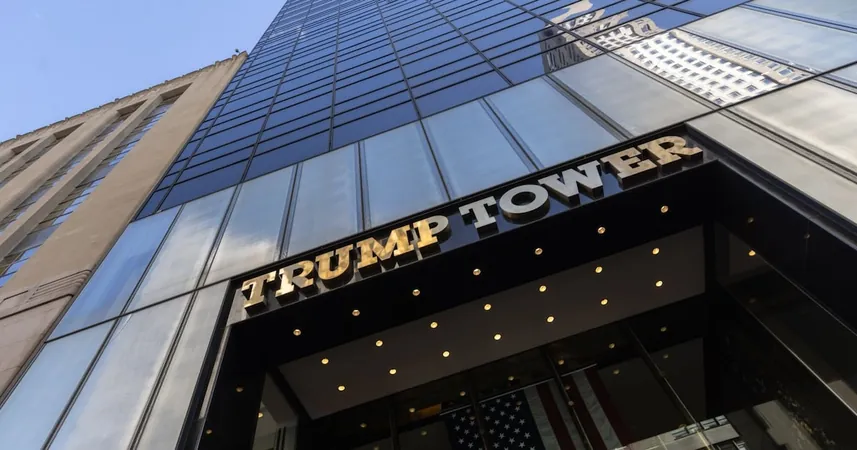
Markets on Edge: U.S. Stocks Plummet Amid Trade War Fears and Dollar Decline
2025-04-11
Author: Emily
Turbulence in U.S. Markets Amid Escalating Trade War
U.S. stock markets are facing significant turbulence as fears of escalating tensions in the trade war with China loom large. On Friday, the S&P 500 dipped 0.1% in early trading, while the Dow Jones Industrial Average slid by 80 points, or 0.2%, and the Nasdaq composite followed suit with a 0.1% decrease. The volatility in stocks reflects a broader anxiety among investors as uncertainty about the global economy intensifies.
China's Response: Tariffs Surge to 125%
In a dramatic escalation, China announced it is raising tariffs on U.S. goods to a staggering 125%. This retaliatory measure comes in response to U.S. President Trump's recent tariff increases, marking a significant point in the ongoing trade showdown. A Finance Ministry spokesperson criticized the U.S.'s aggressive tariffs as a 'numbers game' lacking true economic significance, yet warned that China would respond resolutely to protect its interests.
Consumer Confidence Takes a Hit
Rising tensions between the world's two largest economies are beginning to strain consumer confidence. A recent poll from the University of Michigan revealed that sentiment among U.S. consumers is falling more sharply than anticipated. Joanne Hsu, the survey’s director, noted that this decline is widespread, affecting all demographics and raising concerns over potential impacts on consumer spending.
Gold Prices Surge as Investors Seek Safe Havens
In the midst of market chaos, gold prices surged over 2%, drawing investors who typically flock to safer assets during turbulent times. Conversely, the U.S. dollar continued its decline against major currencies, while longer-term Treasury bonds also saw a fall in value—defying their usual status as a safe haven, leading to increased yields.
Rising Yields Signal Financial System Anxiety
The yield on the 10-year Treasury bond rose sharply, jumping to 4.54% from 4.40% late Thursday, adding pressure not only to the stock market but also to mortgage rates and loans for both consumers and businesses. Analysts suggest that concerns over the trade war may be prompting foreign investors to divest from U.S. bonds, hinting at a growing anxiety about the U.S. economic reputation.
Mixed Earnings Reports Fail to Stabilize Markets
Despite some strong earnings from major banks like JPMorgan Chase and Wells Fargo, the market remains volatile. While JPMorgan's profits exceeded expectations, other major players like Morgan Stanley experienced losses. This mixed bag of results has failed to establish a clear direction for traders adjusting to the rapid changes.
Inflation Fears Escalate
Adding to the uncertainty, a recent inflation report indicated rising concerns about future price increases, with consumers now expecting inflation to hit 6.7% over the next year, the highest forecast since 1981. This could hinder the Federal Reserve's ability to cut interest rates, complicating efforts to stabilize the economy.
Global Markets Reflect Unease
Internationally, stock markets mirrored the volatility seen in the U.S. Germany's DAX fell by 1.2%, whereas the FTSE 100 in London gained 0.4%, buoyed by economic growth data. Meanwhile, Japan's Nikkei 225 dropped by 3%, displaying the wider global trepidation surrounding the trade war.









 Brasil (PT)
Brasil (PT)
 Canada (EN)
Canada (EN)
 Chile (ES)
Chile (ES)
 Česko (CS)
Česko (CS)
 대한민국 (KO)
대한민국 (KO)
 España (ES)
España (ES)
 France (FR)
France (FR)
 Hong Kong (EN)
Hong Kong (EN)
 Italia (IT)
Italia (IT)
 日本 (JA)
日本 (JA)
 Magyarország (HU)
Magyarország (HU)
 Norge (NO)
Norge (NO)
 Polska (PL)
Polska (PL)
 Schweiz (DE)
Schweiz (DE)
 Singapore (EN)
Singapore (EN)
 Sverige (SV)
Sverige (SV)
 Suomi (FI)
Suomi (FI)
 Türkiye (TR)
Türkiye (TR)
 الإمارات العربية المتحدة (AR)
الإمارات العربية المتحدة (AR)